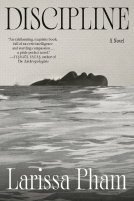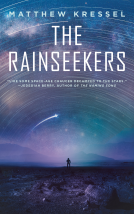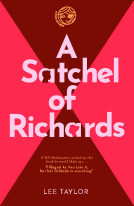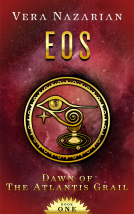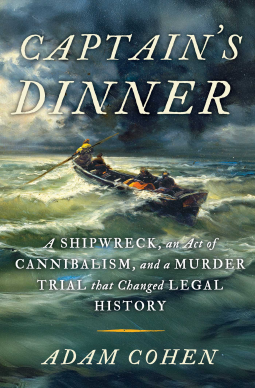
Captain's Dinner
A Shipwreck, An Act of Cannibalism, and a Murder Trial That Changed Legal History
by Adam Cohen
This title was previously available on NetGalley and is now archived.
Send NetGalley books directly to your Kindle or Kindle app
1
To read on a Kindle or Kindle app, please add kindle@netgalley.com as an approved email address to receive files in your Amazon account. Click here for step-by-step instructions.
2
Also find your Kindle email address within your Amazon account, and enter it here.
Pub Date Nov 18 2025 | Archive Date Nov 25 2025
Talking about this book? Use #CaptainsDinner #NetGalley. More hashtag tips!
Description
On May 19, 1884, the yacht Mignonette set sail from England on what should have been an uneventful voyage. When their vessel sank in the Atlantic, Captain Thomas Dudley and his crew found themselves adrift in a tiny lifeboat. As days turned to weeks, they faced an unthinkable choice: starve to death or resort to cannibalism.
Their decision to sacrifice the youngest—17-year-old cabin boy Richard Parker—ignited a firestorm of controversy upon their rescue. Instead of being hailed as heroes and survivors, Dudley and his crew found themselves at the center of Regina v. Dudley and Stephens, a landmark murder trial that would establish the legal precedent that necessity cannot justify murder—a principle that continues to shape Anglo-American law today.
In Captain's Dinner, acclaimed journalist, Pulitzer Prize juror, and New York Times bestselling author Adam Cohen masterfully depicts both the harrowing weeks at sea and the sensational trial that followed. "Is killing one innocent person justified if it saves the lives of three others? Cohen's answer—in this riveting account—reads like a thriller" (former U.S. Secretary of State Antony J. Blinken). Through this Victorian tragedy, Cohen reveals an enduring conflict between primal instincts and moral principles. This book will “make you think long and hard about what you might do to survive” (Ezekiel J. Emanuel, M.D., Ph.D., University of Pennsylvania).
Perfect for readers of David Grann's The Wager and Nathaniel Philbrick's In the Heart of the Sea, this pulse-pounding true story has become a real-life example of one of life's greatest moral dilemmas. “Thoroughly researched and impeccably argued” (Martel). Rich with narrative detail and real-life courtroom twists, “brilliant and profound,” (bestselling author Amy Chua), Captain's Dinner strikes at the heart of a question that haunts us all: When does survival justify murder?
Available Editions
| EDITION | Other Format |
| ISBN | 9798893310597 |
| PRICE | $32.00 (USD) |
| PAGES | 448 |
Average rating from 40 members
Featured Reviews
Cannibalism occurs in a wide range of species across the natural world, and early humans and Neanderthals were no exception. Several ancient cultures across the globe also practiced it. Long considered one of humanity’s ultimate taboos, it has nonetheless persisted into the modern era, perhaps most notably as “survival cannibalism,” when individuals, faced with starvation, consume human flesh to stay alive.
Maritime history is filled with tales of shipwrecked sailors driven to cannibalism while awaiting rescue. The story of Captain’s Dinner recounts one of the most infamous of these: the wreck of the yacht Mignonette and the crew’s decision to kill and eat a shipmate. What makes this case especially shocking is that it occurred in 1884, at the height of the Victorian era.
In Captain’s Dinner, legal historian Adam Cohen guides readers through the Mignonette crew’s harrowing ordeal at sea and the gripping trial that followed. Victorian reformers would ultimately use the case, Regina v Dudley and Stephens, to redefine British legal history.
Per the book’s description:
Perfect for readers of David Grann’s The Wager and Nathaniel Philbrick’s In the Heart of the Sea, this haunting true story has become the classic real-life illustration of one of philosophy’s greatest moral dilemmas, captivating audiences from ethics classrooms to Hollywood and inspiring countless explorations in film, television, and popular culture of humanity’s most challenging question: When does survival justify murder?
Many thanks to NetGalley and Authors Equity for providing an advance copy of this book for review.
Book Summary
On May 19, 1884, the yacht Mignonette set sail from Southampton, England, bound for Sydney, Australia. Despite ominous warnings, the voyage began smoothly enough. However, disaster struck on July 5 when a mighty wave struck and sank the ship. It happened so suddenly that the four-man crew barely had time to escape with their lives—Mignonette sank in just five minutes.
Adrift in the South Atlantic in a tiny lifeboat with no fresh water and only two tins of turnips for food, Captain Thomas Dudley and his crew were at the mercy of the elements. Days turned into weeks, and the crew’s suffering was immense. A captured sea turtle, occasional rainwater, and drinking their own urine were all that kept the men alive.
On July 24, Captain Dudley and Edwin Stephens made the decision to kill the youngest member of their crew, 17-year-old cabin boy Richard Parker. They carried out their plan the next day. “What, me, Sir?” Parker murmured before the captain slit his throat with a pen knife. The last crewman, Edmund Brooks, hadn’t been in on the plan. Despite this, he eagerly partook of the grisly feast with his shipmates.
Four days later, the German barque Moctezuma spotted the Mignonette’s survivors and rescued them. When they returned to Great Britain a month later, they were upfront about what had happened. As a result, they were thrust into a landmark murder trial that challenged society’s perspective on ethics and survival. For the first time, an English court put cannibals on trial, breaking with centuries of tradition at sea. It would pit humanity’s most basic instincts against its deepest moral convictions.
My Thoughts
Captain’s Dinner is exceptionally well written and thoroughly researched, offering an extensive examination of survival cannibalism at sea. At the center, of course, are the tragic circumstances surrounding the Mignonette and her wretched crew. Adam Cohen draws on survivor testimonies, court records, newspaper accounts, and other primary documents to craft a fascinating, compelling, and ultimately tragic narrative. I found myself engaged from start to finish.
The tragic and grisly details surrounding Richard Parker’s killing and butchering, along with the chapter on the broader history of cannibalism, are graphic and gripping—true crime enthusiasts will likely find this material especially engaging. There are enough gory details in Captain’s Dinner that I really considered waiting to post this review until closer to Halloween.
At the heart of Captain’s Dinner lies a profound moral question—is it ever justifiable to take one life to save another? Cohen revisits this dilemma repeatedly throughout the book. While the emphasis can feel repetitive at times, it reflects the complexity and gravity of the issue. The court case was, after all, an attempt by British elites to put an end to the longstanding “custom of the sea”—and the practice of targeting the most vulnerable among a shipwrecked crew.
As befitting a work of legal history, the book includes a fair amount of legal terminology and procedural detail. However, most readers should still find it accessible. I personally found it fascinating to learn how the British judicial system operated in the Victorian era, especially as an American whose only frame of reference has been British murder mysteries on Mystery! or reading Agatha Christie novels.
Conclusion
Overall, I thoroughly enjoyed Captain’s Dinner and would recommend it. It’s engaging, compelling, gory, and impressively comprehensive. As I mentioned earlier, true crime fans will likely find it fascinating, but it should also appeal to legal historians, maritime enthusiasts, and philosophers. There’s something here for each of these communities—or for someone (like me) with an eclectic range of interests.
Captain’s Dinner is a book that stays with you. The moral questions it raises, the harrowing choices faced by desperate people, and the way society chooses to judge those actions linger in your mind long after the final page. It doesn’t just recount the story of a shipwreck; it forces readers to confront uncomfortable truths about human nature, survival, and the thin line between civilization and instinct.
 Janine S, Reviewer
Janine S, Reviewer
I'd like to thank NetGalley and the publishers of this book for allowing me to read this most interesting book about a legal precedent (is taking of a life at sea acceptable and then eating the victim in order to survive?) and historical case in Britain in the late Victorian Era that created a new precedent. The author does a first rate job in detailing what changed from past acceptance of events of cannibalism at sea to setting in motion a review of this long precedence.
Most importantly the case came at a time was Britain was enacting reforms especially those that affected the vulnerable in their population. You have to read the book to find out what the decision was and this affected not only Britain but other countries as well.
It's always the books in the middle which are the hardest to review. Captain's Dinner (ew, and you'll know why in a second) by Adam Cohen is one of those books where I have very little to complain about, but I also think could probably have been much shorter. The setup is certainly intriguing, so let's talk about it.
It's 1884 and a rich guy bought a yacht he wants sailed from England to Australia. Four men take the gig and set sail. There are many issues including the fact that yachts at this time are not suited to long voyages across oceans. The boat sinks, and while all four make it into the lifeboat, they are set adrift with no water, very little food, and no hope unless a ship finds them. The cabin boy ends up murdered and eaten. The survivors are found days later and saved. I'm not spoiling anything. All of this information is in the description/summary.
The bulk of the book is about HOW the cabin boy ended up food. The perpetrators never tried to hide what happened. However, they didn't expect to get charged with murder which is precisely what happened. Cohen's narrative hinges on the fact that this entire scenario challenged many people and how they apply their own sense of morality.
Here is where my issues with the book come into play. The entire narrative portion of the book is only slightly longer than 200 pages. There is a fair bit of repetition of certain things which means it probably could have come in quite shorter. This is probably too long for an essay, but feels too short for a book. However, I have zero problem with anything in it (with the exception of the aforementioned repetition, which is not egregious). The story flows. Cohen proposes interesting thought experiments.
In summary, if you like stories which have a good bit of history with philosophy applied (and law), then I think this might be a must read. If you are looking for a sea adventure like The Wager or In the Heart of the Sea (two of the best ever), then you may be a bit let down with how little of the narrative is about the survival story. To each their own! I liked it.
(This book was provided as an advance reader copy by NetGalley and Authors Equity.)
 Max A, Librarian
Max A, Librarian
Captain's Dinner felt like a companion book to David Grann's The Wager in all of the best ways. They cover a similar time period, a similar topic in terms of a shipwreck, and both give the reader plenty of things to think about. Where Captain's Dinner deviates from The Wager is that it is less focused on the shipwreck itself and more about the social, historical, and political happenings of the time that were changing how the world viewed the incident. While the author is pretty clear in both the book and afterward that they see utilitarianism as a flawed view of ethics, I can certainly see how some readers could view the actions of Dudley and Stephens as an ethically correct decision. This would make a wonderful Book Club book.
 Librarian 1411760
Librarian 1411760
This was so interesting and yet so viscerally horrifying. I had never heard of this case (as a librarian and not a lawyer), but the intricacies here were so interesting - if you could get past the multiple descriptions of murder and cannibalism.
 Greg K, Reviewer
Greg K, Reviewer
The book read well and was interesting. However, certain situations of English law or trail presidencies seemed to be repeated multiple times as if the reader may have forgotten the salient point being made (e.g., special verdict).
Since there were no supplies in the inadequate life boat, I'm surprised that no preventative regulatory changes were made to require an adequate number of sea worthy vessels available for both crew and passengers and to ensure they are appropriately supplied?
I thought the "Afterwards" was a bit tedious and could have been condensed, though I'm not one to spend an inordinate amount of time in academic, philosophical debate. Just my opinion.
Below are some editing concerns. BTW, the Kindle version I downloaded did not have page numbers.
In Chapter 6 there is an inconsistency in the formatting of literary titles. Examples - italicized titles of writings by Brantlinger, Dickins and Kingsley; quotes used for writings by Kipling and Stead's and no formatting for Mearns’s non-fiction report.
In Chapter 7 the author wrote. "Brook’s refusal also undermined the defense’s argument that it was better for one person to die so four could live" should say "... so three could live".
In Chapter 9 a sentence reads "When the time came for the jury’s response, the foreman said that it was their view that the men the men “would have died if they had not had this body to have fed on" with a double "the men".
 Marianne K, Reviewer
Marianne K, Reviewer
I found this to be a fascinating and engrossing read. Although the legal case is a famous one, I'd never heard of it. The author is thorough in his treatment of the history surrounding The Queen v. Dudley as well as the moral conundrum of what people should do to survive in life or death circumstances. I would recommend the book and have only one complaint with the title which I thought was a poor choice.
Readers who liked this book also liked:
Marie Bostwick
Historical Fiction, Literary Fiction, Women's Fiction
Patti Eddington
Biographies & Memoirs, Humor & Satire, Parenting, Families, Relationships





